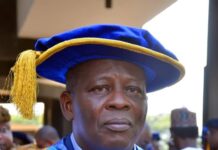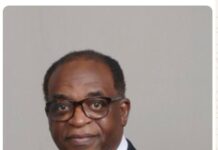 I was in Senegal last week for a conference and for the first time in a long while, it felt so good to be a Nigerian. The Conference which was on conflicts in the Sahel region started with a standing ovation to all Nigerians for the successful conduct of the elections the whole world feared would lead to the end of Nigeria. There was consciousness that many people played a role in achieving this peaceful outcome but the consensus was that it was the Nigerian voter that played the greatest role. As for the others, I was pleased to learn that there in Dakar, for ten consecutive Mass sessions, prayers for successful elections in Nigeria were held in St Dominic Catholic Church. As for the Tijjaniyya movement, 1500 recitals of the Quran were conducted for safe Nigerian elections. Yours truly and other Nigerians at the event were for three days showered with congratulations for making Africa feel proud. Nigeria is rising and it’s great to be a Nigerian. Lets resolve to make Nigeria even greater, which unfortunately is no easy task.
I was in Senegal last week for a conference and for the first time in a long while, it felt so good to be a Nigerian. The Conference which was on conflicts in the Sahel region started with a standing ovation to all Nigerians for the successful conduct of the elections the whole world feared would lead to the end of Nigeria. There was consciousness that many people played a role in achieving this peaceful outcome but the consensus was that it was the Nigerian voter that played the greatest role. As for the others, I was pleased to learn that there in Dakar, for ten consecutive Mass sessions, prayers for successful elections in Nigeria were held in St Dominic Catholic Church. As for the Tijjaniyya movement, 1500 recitals of the Quran were conducted for safe Nigerian elections. Yours truly and other Nigerians at the event were for three days showered with congratulations for making Africa feel proud. Nigeria is rising and it’s great to be a Nigerian. Lets resolve to make Nigeria even greater, which unfortunately is no easy task.
The conference convened by the Economic Commission for Africa was an occasion to consider results of studies done on the causes of violent extremism in the Sahel and its developmental costs and consequences. According to Madam Hiroute Sellassie, the United Nations Secretary General’s Special Envoy for the Sahel, the defence budget of Niger Republic for example has had a ten-fold increase in just four years. As the country is already the last in the world human development index, the dramatic increase in defence expenditure means that there is a complete stop to human development efforts and the irony is that as poverty and misery increase, the conditions favouring the spread of violent extremism would deepen.
The challenge, the researchers pointed out is to develop a strategy in which the choice is not a zero-sum game between security on one hand and development on the other; both of them are vital for the survival of the Sahel, and indeed the wider world. Professor Olukoshi rightly reminded the audience that a few years ago, the Sahel had been side-lined into the wasteland of international politics but with the emergence of violent extremism, it has now occupied pride of place in international strategic concerns. The sentiment at the conference is that for the world, the concern is limited to security issues. It is the responsibility of the governments and citizens of the zone to bring poverty-reduction and development back into the nexus.
Over the past few years, the “core” Sahel – Burkina Faso, Chad, Mali, Niger and Mauritania have suffered coup d’états and political upheaval and the entry of Nigeria into the arena of the Sahel’s growing problem of violent extremism portends serious danger to the future of the region and the wider world. According to the principal researcher, Professor Funmi Olonisakin, the Sahel is plagued by a security complex in which the development of a politicised military, high levels of public corruption, a population dynamics in which high fertility rates are compounded with transnational migration and porous borders reinforce each other in breeding violent extremism especially along the two corridors of high level violence in Northern Mali/Algeria/Libya and North East Nigeria and the Lake Chad Basin. Currently, the countries in the zone spend between 25-50% of their national budgets on security and are pushing themselves into the trap that security alone matters.
The key problem identified was that for too long, planned responses and been developed and implemented at the national levels while the issues driving the crisis have always had a regional and global dynamics interacting with local ones. The humanitarian problems generated are massive and national and international communities are just scratching the surface. As millions of Sahelians become refugees and internally displaced persons, the misery of the people multiplies.
The key conclusion from the meeting is that the countries of the Sahel and their Saharan and Southern neighbours must realise that the international community has a low capacity to solve their problems. Increasingly, development partner organisations are becoming dependent of the percentage of aid that they keep for themselves. Western governments are just interested in keeping the terrorists out rather than solving the problems that generate terrorism. Development efforts are disjointed and the active international organisations in the region end up with different strategies dependent of the specific Sahelian countries identified by the countries that sponsor them. The Sahel crisis is confounded by the fact that no one has a Sahel strategy, just disparate and partial approaches that often work at cross-purposes.
Meanwhile, radicalisation defined as the emergence of sectarian rupture to the zone’s established sociological order is growing and spreading. Bakary Sambe from the Senegalese centre for the study of radicalisation argued that we are just harvesting the fruits of the structural adjustment programmes of the 1980s when the West imposed hardship on Africa and Muslim humanitarian aid came in from Saudi Arabia, Qatar, Morocco and Algeria, each coming in with a different religious and political agenda. Over three decades, they greatly impacted on Islam as it was practiced in the region and while our countries assumed they were receiving fraternal aid, the foundations for the present crisis were being laid. Totalitarian visions of society were inculcated into Sahelians who began to lose their own “normal” religious values. Before we knew it, a class struggle was raging between the corrupt power elite and the disinherited masses who have been driven into agency as they discover their grievances, a normative framework to express it and support in turning into action.
As Nigeria’s president elect gets ready to assume duties, he will find himself confront a security and development challenge that has impacted greatly on societal coherence and created huge problems for the economy, agriculture and livelihoods. He would find that unlike when he ruled previously, Nigeria has lost its leadership in the zone and would have to swallow his pride as he negotiates with neighbours that are conscious of our weakened status. He will also find an international community that is not very useful. I do not envy the job description Nigerians gave Mohammadu Buhari – build the State, secure it, provide jobs and destabilise public servants adept and competent in stealing public resources while trying to work with neighbours that now think they are stronger than Nigerians. Wow, what a daunting job description. It will not be easy but we have no choice, the work has to be done.



